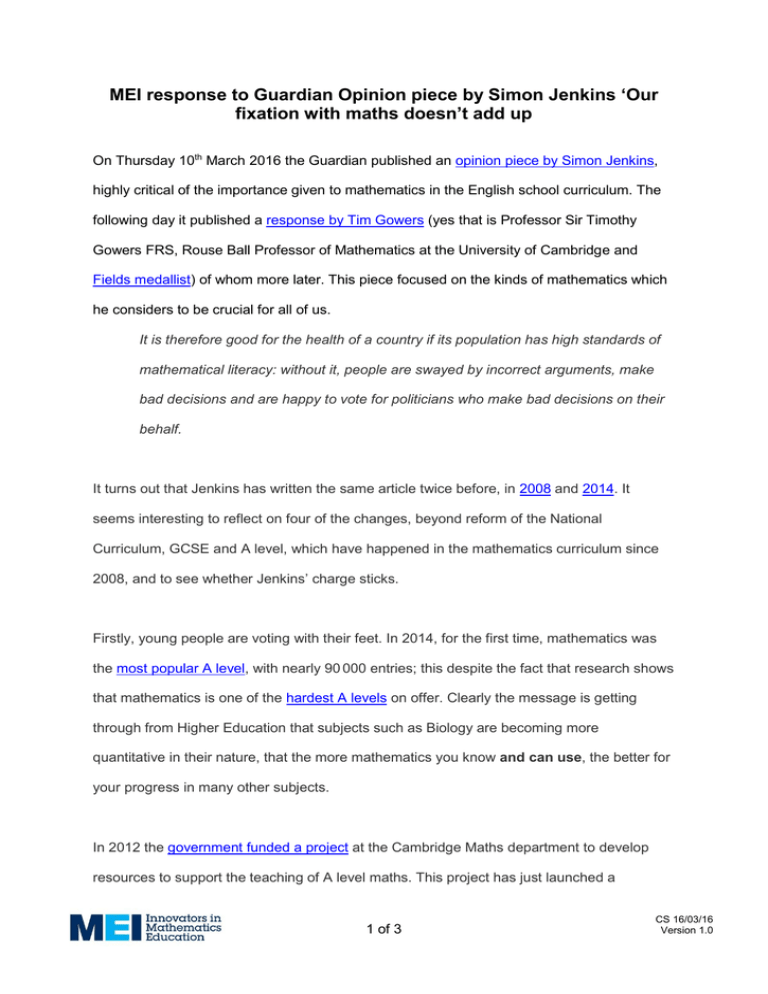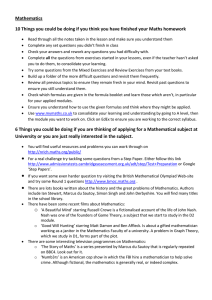MEI response to Guardian Opinion piece by Simon Jenkins ‘Our
advertisement

MEI response to Guardian Opinion piece by Simon Jenkins ‘Our fixation with maths doesn’t add up On Thursday 10th March 2016 the Guardian published an opinion piece by Simon Jenkins, highly critical of the importance given to mathematics in the English school curriculum. The following day it published a response by Tim Gowers (yes that is Professor Sir Timothy Gowers FRS, Rouse Ball Professor of Mathematics at the University of Cambridge and Fields medallist) of whom more later. This piece focused on the kinds of mathematics which he considers to be crucial for all of us. It is therefore good for the health of a country if its population has high standards of mathematical literacy: without it, people are swayed by incorrect arguments, make bad decisions and are happy to vote for politicians who make bad decisions on their behalf. It turns out that Jenkins has written the same article twice before, in 2008 and 2014. It seems interesting to reflect on four of the changes, beyond reform of the National Curriculum, GCSE and A level, which have happened in the mathematics curriculum since 2008, and to see whether Jenkins’ charge sticks. Firstly, young people are voting with their feet. In 2014, for the first time, mathematics was the most popular A level, with nearly 90 000 entries; this despite the fact that research shows that mathematics is one of the hardest A levels on offer. Clearly the message is getting through from Higher Education that subjects such as Biology are becoming more quantitative in their nature, that the more mathematics you know and can use, the better for your progress in many other subjects. In 2012 the government funded a project at the Cambridge Maths department to develop resources to support the teaching of A level maths. This project has just launched a 1 of 3 CS 16/03/16 Version 1.0 wonderful website of problems at https://undergroundmathematics.org/ which bring out the connections in mathematics – hence the ‘tube map’ on the front page. This raises the game – mathematics is not the kind of tedious activity which Jenkins bemoans that students have to endure, but a rich web of powerful and useful ideas for solving problems, increasingly important in the digital age. The new National Curriculum supports this approach for every age group - mathematics is useless unless you understand it and can use it. The second project funded by the government in October 2012 was partly in response to Timothy Gowers’ blogs about real world problems which rely on mathematical ideas for their solution, though you may not know that when you start out. He wondered whether this might be the basis for a more interesting school mathematics curriculum; his wondering aloud turned into money from the DfE, the money turned into the Critical Maths project and this has informed the development of Core Maths, an alternative maths qualification for post-16 students who have succeeded at GCSE but who need a different mathematical diet from the calculus in A level maths. The best Core Maths qualifications include exactly the kind of maths which Tim Gowers enthuses over and which, to be fair, Simon Jenkins approves of by recommending ‘Innumeracy’ by John Allen Paulos: the kind of maths which a literate society needs for its decision making at every level. A fourth, more recent, development has been the work with maths teachers from Shanghai. There are many lessons to ponder, but one is very striking. Jenkins agrees that some young people need the kind of maths that leads to A level, but that we shouldn’t therefore inflict algebra and trigonometry and Pythagoras on all our children. But how do you decide which children need which kind of maths, and at what age? A key feature of teaching in Shanghai is that all children are capable of mastering maths in a rich, problem solving way; that children do not need to be labelled as failures at a young age, and denied access to the mathematics that facilitates their future progress. For me this is a matter of equality of opportunity and social mobility (and what else is education for?). All children should be given 2 of 3 CS 16/03/16 Version 1.0 access to the mathematics which means they have a genuine choice at age 16 of the route they want to take for their future education and careers. This includes algebra and trigonometry and Pythagoras, taught in a way that encourages deep understanding and an ability to use what they are learning. It will be fascinating to see whether we are humble enough to learn from the Chinese how we make difficult ideas accessible to all. I feel privileged to work for Mathematics in Education and Industry, and to reflect on our involvement in all four of these developments. We play our part, in managing the Further Mathematics Support Programme, in encouraging uptake of A level Mathematics and Further Mathematics. We run the professional development that introduces teachers to the Underground Mathematics project. We ran the Critical Maths project and have developed two Core Maths qualifications which make use of the ideas from the project. We are deeply involved in the running of the NCETM which has been organising and promoting the exchange of teachers with Shanghai. We see a very positive future for mathematics education in the UK, one in which all our young people engage with the mathematics they need for their and the country’s future. There are a lot of challenges ahead, not least the supply of well-qualified and enthusiastic teachers, but we are making progress. Things have changed since 2008! Charlie Stripp Chief Executive, Mathematics in Education and Industry 16th March 2016 3 of 3 CS 16/03/16 Version 1.0



